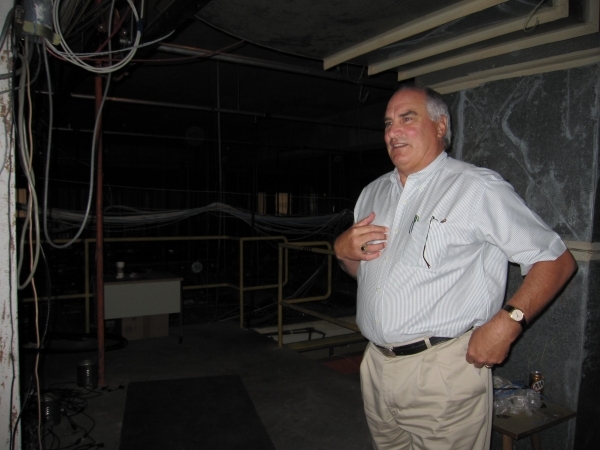Lalo Perez had spent hundreds of grueling Monday nights at Palo Alto City Hall, but he wasn't in attendance on June 25, when the City Council approved a resolution of appreciation recognizing his 33 years of service.
"I like to let my work do the talking," Perez told the Weekly the day after his July 5 retirement from his position as chief financial officer. (Read more from our one-one-one interview with Perez on his three decades at City Hall here).
Public Works Director Michael Sartor also wasn't looking for publicity when he officially began his retirement on July 7, two days after Perez. Sartor had spent 16 years in the department, the past eight as the department head. During his watch, the city has seen a surge of street repaving; it reconstructed three library branches; and it began the process of retiring the city's sludge-burning incinerators in the Baylands.
The loss of 48 years of institutional knowledge in the span of three days would hit any organization hard, but the challenge is particularly severe in Palo Alto, where every month seems to bring another gaping vacancy to the senior-management ranks. The city has been without a permanent planning director since Hillary Gitelman departed in May to accept a job in the private sector. Development Services Director Peter Pirnejad left for Napa in February and has not yet been replaced. Neither has Rob de Geus, former head of the Community Services Department who last year was named deputy city manager (the department is now being led on an interim basis by Library Director Monique le Conge Ziesenhenne).
The changes are happening just as City Manager James Keene is wrapping up his decade in charge of the organization. Anticipating Keene's retirement, the council last month named Ed Shikada, a nimble policy veteran who serves as both assistant city manager and utilities general manager, as his replacement. Even that appointment, however, comes with a hitch: The council now faces the daunting prospect of hiring someone for the historically difficult-to-fill utilities general manager position.
To make matters even trickier, the city is launching its various recruitment drives during one of the hottest seller's markets in recent history. With baby boomers retiring, cities throughout region have been seeing more vacancies at the top of their organizations — a trend that is driving intense competition for talent and higher salaries for new hires.
Palo Alto is part of a group of cities that is going through a transition at its most senior level. Just last spring, the city managers of Cupertino, Fremont and San Mateo announced their plans to retire in July, September and December, respectively. John Maltbie, county manager at San Mateo County, is also stepping down later this year. And last August, in perhaps the most extreme example of the trend, the city of Santa Clara lured away Sunnyvale's then-City Manager Deanna Santana with a compensation package that included a base salary of $372,886 (roughly $100,000 above what she made in Sunnyvale) and a monthly housing allowance of $3,750.
Shikada will receive a base salary of $356,000, with a total compensation package to include an $18,500 contribution to a 457 "deferred compensation" account. He also will receive a housing allowance of $4,000 a month until he is able to find permanent housing in Palo Alto, according to the city's announcement.
The fierce competition for talent helps explain why council members in Palo Alto — a city where it takes years to figure out how many parking permits to sell to downtown workers — made one of their most critical decisions, the hiring of a new city manager, in seemingly a blink of an eye. Members of the Council Appointed Officer's Committee (which is responsible for evaluating the four council-appointed officers: city manager, city attorney, city clerk and city auditor) told the Weekly that it was the market pressures, as much as Shikada's qualifications, that prompted them to act fast in locking up Keene's replacement.
Mayor Liz Kniss, who formally announced Shikada's appointment at the June 25 meeting, told the Weekly that Shikada already had been involved in interviews with two other cities, which had both indicated that he was one of their top choices. As former San Jose city manager, Shikada knows Silicon Valley well, which makes him a stronger candidate than someone brought in from the outside, she said. Given the high likelihood that Shikada would take the city manager job in Cupertino or elsewhere, the committee agreed that it's better to move quickly on appointing Shikada.
The council plans to approve his contract shortly after it returns from its July break.
The hot market for executive talent seems to have caught the council off guard. Kniss called the expedited process of selecting a city manager "regrettable" and suggested that the council would have begun the search sooner had it known that the competition for senior executives would be so fierce.
"Had we guessed at the end of last year that this was a situation we were in, we would've handled it quite differently," Kniss said.
But she noted that going through a normal recruiting process, which typically takes about nine months, would also be far from ideal given the high number of current vacancies at City Hall and Keene's planned departure in December. The task of finding an outside candidate is particularly daunting at a time when the Bay Area is experiencing a housing crisis and escalating cost of living, she noted. According to the 2018 Silicon Valley Index, an annual publication by Joint Venture Silicon Valley, the median sale price of a Silicon Valley home was $968,000 last year, compared to $454,000 statewide and $212,000 nationwide. Furthermore, home prices in Silicon Valley had risen by 7.4 percent between 2016 and 2017, compared to 3.7 percent in California as a whole, according to the report.
The rising cost of living helps explain why cities in Silicon Valley have tended to poach talent from one another, rather than undertake nationwide searches.
"If you bring someone in from, say, Milwaukee, they take one look at the housing prices and the cost of living here and they say, 'It's not going to work,'" Kniss told the Weekly. "So we've been watching on the Peninsula lately how Santa Clara poached the city manager from Sunnyvale. We know Cupertino is in the running for a new city manager and they would have talked with Ed.
"We've talked to any number of people in the business — not just recruiters but people in the evaluation business — and each said, 'This isn't your father's recruitments.'"
Kniss noted that the impact of baby boomer retirements is exacerbated by a relatively small number of younger workers coming into the public sector.
"On the incubator end, there is really a dearth of people between 25 and 35 coming in. So you are trying to hire about five top people in a hard economy, and also in a situation where there's not a lot of people coming through the pipeline.
"Apparently, city government doesn't have the same sheen it once did."
For the council, Shikada's appointment represents both a fresh start and a sense of continuity, which Councilman Tom DuBois said is particularly important as the city moves ahead with the various recruiting efforts. Potential recruits want to know who will be in charge of the organization before they commit, said DuBois, who serves on the Council Appointed Officers Committee.
"With Jim retiring, if Ed had left and we were doing a city manager search, it would have been very difficult to fill other positions because people want to know who their boss is going to be," DuBois told the Weekly. "With both Jim and Ed here until December, we're in very good position to recruit. I hope the public understands it — it's a very positive thing."
Continuity at the top does not, however, guarantee that recruiting will be easy. Perez noted that one of the assistant director positions in the Administrative Services Department has been vacant since 2016, when City Hall veteran Joe Saccio retired. The city is still trying to find a replacement, Perez said. (There is a candidate in another Peninsula city that the city is trying to recruit, but it's not final yet, he said.)
The hot market isn't limited to City Hall's senior executives. The Palo Alto Police Department still has about 14 vacancies and its recent efforts — which include 10 recruitment events, a $25,000 hiring bonus (one of the highest in the state) and, most recently, a $5,000 raise for all positions — have netted only two new hires. Meanwhile, 11 officers have left for other agencies in the past two years, with five going to Santa Clara.
In discussing the Police Department's staffing challenge, a recent report from the Human Resources Department points to an "industry-wide wave of retirements of baby boomers who are exiting their police careers," a trend that coincides with a regional and national shortage of police applicants.
Perez noted that Palo Alto presents other challenges for new recruits. Housing costs in the city are even higher than elsewhere in the Bay Area, which often creates the need for long commutes. The city's pension reforms, which were instituted in the aftermath of the 2008 recession, have created a new tie with lower payments — a move that may be fiscally prudent but that makes it harder to attract people with experience, Perez said.
"People don't want to take a reduction in pensions, especially later in their careers, which is when you're about to get your pension," Perez said.
Like others, Perez said he has seen competition for talent intensify in recent years, with cities "stealing from each other." One way to deal with the trend, he said, is to devote more time to training young talent and promoting from within. It certainly helps that with Perez and Sartor both retiring this month, the city has two experienced replacements — and potential candidates — to serve in the interim. Assistant Public Works Director Brad Eggleston, who has worked in every division of Public Works and who is now shepherding forward the city's infrastructure plan, was tapped to replace Sartor while recruitment is underway.
Kiely Nose, director of Office of Management and Budget, will meanwhile take over for Perez as the interim director of the Administrative Services Department, Keene announced on June 25. Keene also said that he and Shikada will discuss what to do about the chief financial officer position over the summer.
• Read a Q&A with now-retired Chief Finance Officer Lalo Perez, who reflects on his three decades at City Hall.





Comments
Community Center
on Jul 20, 2018 at 11:18 am
on Jul 20, 2018 at 11:18 am
Let's try and make to with less staffing and more efficiency. My perception is that the city administration is bloated.
We should outsource more "real work" to the private sector via competitive bidding. That way we don't end up paying years of generous pensions and lifetime health benefits for retirees and their families.
Registered user
Leland Manor/Garland Drive
on Jul 20, 2018 at 11:56 am
Registered user
on Jul 20, 2018 at 11:56 am
Stew, ,I'm afraid you don't recognize the importance of good department leadership. For example, Peter Pirnejad made an enormous difference in the morale of staff and quality of service in the Development Center. That cannot be outsourced.
Crescent Park
on Jul 20, 2018 at 12:11 pm
on Jul 20, 2018 at 12:11 pm
For some, landing a well-paying city/county/state administrative position beats having to look for a real job any day of the week.
Just put in your time, do little PowerPoint and collect your CalPERS later down the road. Now if you're really fortunate and have some 'in-house' connections, you can even 'double-dip' (post retirement) and collect twice your original salary.
Consultants are always in high demand as they allow the regular civil employees to drink coffee and put their phones on call-forwarding.
another community
on Jul 20, 2018 at 8:35 pm
on Jul 20, 2018 at 8:35 pm
"Apparently, city government doesn't have the same sheen it once did."
You think? Take a look at the aggressively hostile comments posted every day on paloaltoonline and you can see exactly why.